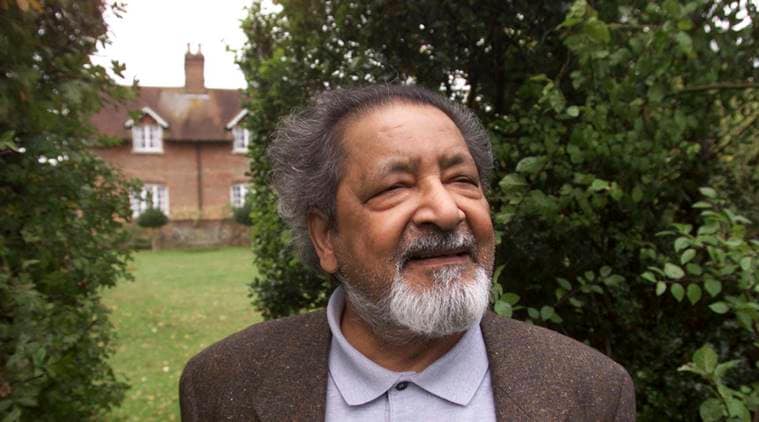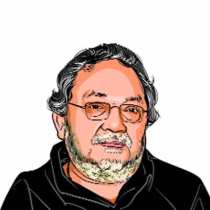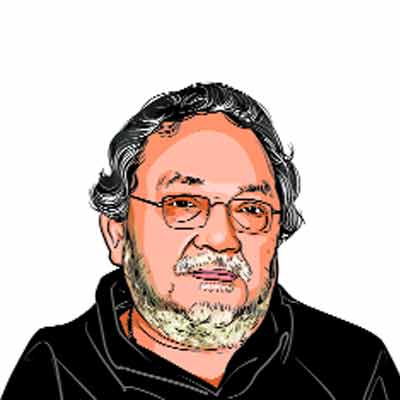The native colonial
V S Naipaul gave writers in once-colonised countries confidence. But he also exonerated colonialism.

It is a familiar problem, and it is possible that V S Naipaul’s (VSN) first, still-born novel too was an essay in some borrowed fictional form.
Years ago, teaching a creative writing class in a hot and dusty Indian classroom, I was surprised at receiving a bunch of student assignments that were all located in distant places: In the American West, where a setting sun silhouettes the avenging gunslinger, returning to administer rough justice; in a Manhattan penthouse, where the only sound is the ice cubes clinking in tall — or is it wide? — martini glasses…
It is a familiar problem, and it is possible that V S Naipaul’s (VSN) first, still-born novel too was an essay in some borrowed fictional form. By the same token, his brilliant appropriation of the “half-made” Caribbean society that he made the subject of his early novels is a heroic achievement. It is in this sense that VSN is the Great Enabler, someone who gave writers in once-colonised countries the confidence to open their eyes, to see the tawdry, half-made and irredeemably shabby lives around them as being endowed with moral, symbolic weight, as worthy of being “told”.
However, VSN’s invention of a new fictional subject is not restricted merely to space, to geography. Indeed, it is practically commonplace to say that the self-fashioning of VSN, from unpromising rural Trinidad to his apotheosis in fat, rural Wiltshire, might well be his greatest achievement. The drama of the formation — transformation, deformation — of post-colonial identities in a globalising world was clearly a fertile subject — and the credit for its invention must go, in great measure, to Naipaul. That said, it must also be said that the narcissistic nature of VSN’s fascination with the subject — as indeed that of the smug “exiles” who imitate him — leaves a great deal of the tragedy of these fragile, shifting, claimed and sometimes only ascribed identities, in today’s world of refugee and Rohingya, strangely unnoticed.
Celebration is indeed in order for a life of heroic creative achievement — but Naipaul’s very seriousness demands that we do not stop there, with ritual valediction. Naipaul’s passing is an occasion for reflection upon the role of literature, of language, in shaping our perceptions of the world. For all the clear-eyed, amused honesty of his early fictions, Naipaul’s writerly trajectory is a paradoxical refutation of one of his best-known sentences: “The world is what it is…” Because in a sense made inescapable by his own writing, the world is also what powerful writers, masters of consciousness, make of it for us lesser mortals. So, praise him we should, and fulsomely. But we must also, after Antony, remember to bury him.
Somewhere mid-career, VSN turned from fiction to non-fiction and, indeed, created that strange, hybrid form, in which the great achievement — simultaneously fiction and non-fiction — was he himself, “Sir Vidia”. Typically, he brought an acute, writerly eye to his non-fictional writing as well, an eye for character, for colour, for turn of phrase, for comic incongruity. But for all his claims to objectivity — I am a camera, I write what I see — the non-fictional form could not confer on him the kind of absolution that the novel-form did. Or almost did. Because despite — and also perhaps because of — all the “white” honours conferred upon him, VSN was widely disliked in Trinidad. But be that as it may, the non-fictional writings are inevitably saddled by the burden, the responsibility of opinion. And any serious consideration of Naipaul must deal with that trajectory.
I remember the avidity with which, as youngsters, we devoured An Area of Darkness (1964). Here at last there was someone who was prepared to disregard the celebratory bullshit that is de rigueur in newly-independent societies — the sentimental lies, the callous hypocrisy — and tell it like it was. Is. Then there was India: A Wounded Civilisation. And one was grateful, once again, for the acute insight into the Indian proclivity for ritualistic forms of doing. Not doing, but the appearance of doing, the hollowed-out institutions, the enormous significance given to superficial, insignificant things — think place-names, think honorifics, think Gurugram.
Perhaps there were hints there already of the transformation that was coming. Naipaul — in fiction and non-fiction alike — has an acute eye for the damage wrought by colonialism, but the ambiguity in his location of the Indian “wound” was already marked by his personal “wound” — the bright Brahmin boy, cast among nondescript and probably lower-caste labourers in a foreign land. Yearning for a lost, remembered — mythical, imaginary — civilisational wholeness which he failed to find in the actual, historical India that he was visiting. This immigrant nostalgia — actually, the nostalgia of the involuntary emigrant — has been noticed earlier, but perhaps it hasn’t been adequately explored. But Naipaul’s translocation of the colonial “wound” to the destruction of Vijayanagara — a standard trope on the Hindu Right — is perhaps not insignificant. It accomplishes two things simultaneously — it exonerates the Brits, and villainises the Muslims.
Summary is all we have space for, but Naipaul’s non-fiction writing is characterised by two features — a presence, and an absence. In addition to the colonial damage which is all too evident in its shabby ridiculous victims in country after country — in Asia, in Africa… — Naipaul is much concerned with Islam, and Islamic societies. Edward Said described his obsession with Islam as an “intellectual catastrophe”. And it seems a fair description in terms of the knowledge that he produced — or failed to produce — through his travels Among the Believers. But his failure to extend his insight into colonial damage to the Islamic societies that attract his contempt and worse becomes particularly significant in the light of the “absence” that I have noted above — his easy accommodation with the beneficiaries of colonialism, the fat, amnesiac societies of the West, who frame their buried histories of terror as “culture”. After all, one can hardly begin to understand the contemporary tragedy of West Asia, of the Middle East, without taking account of Sykes and Picot scavenging on the dying Ottoman Empire, after having betrayed the Arabs.
It is unfortunately too easy to assimilate Naipaul into contemporary Western Islamophobia: Intrinsically evil Islam takes colonialism off the hook. This is made easier by Naipaul’s country gentleman persona, and even more by the slippery pronouns which enable him, with all his insight into societies damaged by colonialism, to talk easily about the “universality” of “Our Universal Civilisation”. Our? Vidiadhar Surajpersad?
Perhaps, finally, there may be another clue buried in the history that landed him in Trinidad. The Brahminical element in the making of VSN has remained under explored. After all, Naipaul is no recognisable Brahmin surname, and implies some deviant, roving ancestor — but Vidia gets around that difficulty by cleaving to his maternal, Brahmin, Capildeo identity. In any case, properly Brahmin identity is unsustainable in the heterogeneous, varna-sankara, society of indentured labourers. But all this only renders the “Brahmin” identity both precious, and precarious. The ideological contortions of this precarious, anxious “Brahminism” are, I would suggest, relevant to understanding the astonishing trajectory of Sir Vidia Naipaul, moving with relative suddenness from being the black face outside the gates to being the token brown one within them, sneering at Muslims along with the nobby white elites — affirming, and confirming, both his Brahminism and his “whiteness”.
The writer taught in the Department of English, Delhi University.
For all the latest Opinion News, download Indian Express App
More From Alok Rai
- The soundtrack of democracySupreme Court order on Jantar Mantar frames an often-ignored reality: Protest is a part of polity and the inconvenience it causes an affirmation of our…
- Blame the hatGeneral Bipin Rawat has been far too eloquent on matters he ought to be quiet about. He did sound silly while elaborating on ways to…
- All About My MotherlandThe evolution of our country's identity from the unifying mother of yore to the strict father of contemporary nationalist times...








































No hay comentarios:
Publicar un comentario